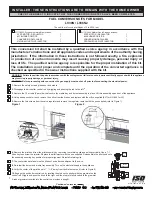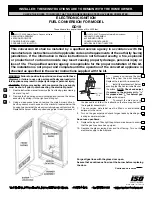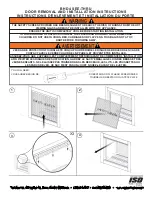
Maintaining Your Appliance
25
© Travis Industries
100-01259
4150520
Failure to properly maintain and inspect your appliance may reduce the performance and life of the
appliance, void your warranty, and create a fire hazard.
Establish a routine for the fuel, wood burner and firing technique. Check daily for creosote build-up until
experience shows how often you need to clean to be safe. Be aware that the hotter the fire the less
creosote is deposited, and weekly cleaning may be necessary in mild weather even though monthly
cleaning may be enough in the coldest months. Contact your local municipal or provincial fire authority
for information on how to handle a chimney fire. Have a clearly understood plan to handle a chimney
fire.
Daily Maintenance (while stove is in use)
Remove Ash (if necessary)
Whenever ashes get
3
to
4
inches deep in your firebox or ash pan, and when the fire has burned down
and cooled, remove excess ashes. Leave an ash bed approximately
1
inch deep on the firebox bottom to
help maintain a hot charcoal bed. Let the stove cool completely before removing ashes (wait at least two
hours after the last coal has extinguished). Ashes should be placed in a metal container with a tight-fitting
lid. The closed container of ashes should be placed on a noncombustible floor or on the ground, away
from all combustible materials, pending final disposal. The ashes should be retained in the closed
container until all cinders have thoroughly cooled.
Follow the directions below to remove ash.
1
Let the stove cool completely (at least two hours after the last coal has extinguished).
2
Place a cloth or cardboard protector over the hearth to catch ash and protect against
scratching.
3
Open the doors and scoop the ash into a metal container with a tight fitting lid. The
closed container of ashes should be placed on a noncombustible floor or on the
ground, away from all combustible materials, pending final disposal.
ASHES
Improperly disposed ashes lead to fires. Hot ashes placed in cardboard boxes, dumped in back yards,
or stored in garages, are recipes for disaster.
Wood-burning stoves are inherently dirty. During cleaning have a vacuum ready to catch spilled ash
(make sure ash is entirely extinguished).
There are vacuum cleaners specifically made to remove ash (even if the ash is warm). Contact your
dealer for details.
Clean the Glass (if necessary)
This appliance has an airwash to keep the glass
clean. However, burning un-seasoned wood or
burning on lower burn rates leads to dirtier glass
(especially on the sides). Do not clean glass with
abrasive cleaners. Allow the stove to fully cool
before cleaning.
Apply glass cleaner or soapy water to the inside of
the glass. Wipe with newspaper or a paper towel
to clean. For stubborn creosote, dip a moist paper
towel or newspaper in cold ash before cleaning.
The ash acts as a mild abrasive.
The glass will develop a very slight haze over time. This is normal and will not affect viewing of the fire.












































